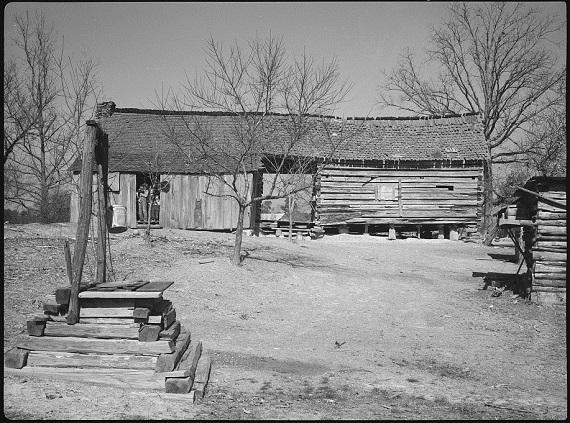Prager U and the American Battlefield Trust recently teamed-up to sponsor this six minute video by Princeton University’s Dr. Allen Guelzo who claims that “the North won the Civil War but the (white) South won Reconstruction.” The photo below taken forty-five years after the Civil War shows the true economic conditions of Guelzo’s supposed Southern victors. There was little change in their primitive working conditions for another thirty or forty years. As late a 1940 half of sharecroppers where white as were two thirds of tenant farmers.
Guelzo’s dominant concern is that Reconstruction failed to fully integrate four million ex-slaves into American society. That, he claims, was the aim of Republican Reconstruction. Only after it ended in 1877 did “the South return to . . . economic backwardness.” He argues that the region should have remained under military occupation “until a newer generation learned a newer lesson about race and rights other than white supremacy.” Additionally, he avers that “we should have gotten [Southern] land ownership into the hands of the ex-slaves” and thereby brought the South into a “free market” economy like that of the North. He gives only a passing nod to the region’s protracted poverty, which he attributes to white supremacy.
Professor Guelzo’s biggest error is his assertion that the South’s impoverishment resulted from an end to Republican Reconstruction in 1877. In reality, it was caused by the wreckage of the Civil War, twelve to seventeen years earlier. Upon returning home after their surrender the typical Confederate soldier found his family in a condition of near, or actual, starvation.
Historian David L. Cohn writes: “When there was a shortage of work stock, the few surviving animals were passed from neighbor to neighbor. [When] there was no work stock [the men] hitched themselves to the plow. By ingenuity, backbreaking toil, and cruel self-denial thousands of Southern farmers survived reconstruction . . . They received no aid from any source, nor any sympathy outside the region.” Despite population growth the South did not reach its prewar level of economic output until 1900. Not until 1950 did it regain its 73rd-percentile prewar ranking in per capita income, which was still well below the national average.
Guelzo falsely implies that anti-black racism was isolated in the South. Horace Greeley, who owned the country’s largest newspaper and was earlier a leading abolitionist, wanted freedmen to get Southern lands in order to keep them from migrating North. Similarly, Massachusetts Congressman George Boutwell proposed that South Carolina and Florida be reserved exclusively for blacks. President Grant’s largest campaign contributor owned the Northern Pacific Railroad, which received land grants equal to the size of Missouri, but his Party did nothing to encourage blacks to seek free western Homesteads where they were unwanted. In fact, what little land the freedmen did get came from 46 million acres of Southern Homestead lands. When a white boxer beat the reigning black heavyweight campion in 1915 the New York Tribune reported that the roar from New York’s financial district “would have done credit to a Presidential victory. . . For a moment the air was filled with hats and newspapers. Respectable businessmen pounded their unknown neighbors on the back” and acted like gleeful children.
Although it is often assumed that Republicans sponsored Southern black suffrage because of a moral impulse to promote racial equality, the bulk of the evidence suggests the Party was more interested in retaining political power.
When the Civil War ended the Party was barely ten years old. Its leaders worried that it might be strangled in its cradle if the re-admittance of Southern states into the Union failed to be managed in a way that would prevent Southerners from allying with Northern Democrats to regain control of the federal government. If all former Confederate states were admitted to the 39th Congress in December 1865 and each added member was a Democrat, the Republicans would lose their near veto-proof two-thirds majority in Congress.
Thus, the infant GOP needed to ensure that most of the new Southern senators and congressmen be Republicans. That meant that puppet governments had to be formed in the Southern states. Since there were few white Republicans in the region the Party needed to create a new constituency.
Consequently, Republicans settled on two goals. First was mandatory African-American suffrage in all former Confederate states. The Party correctly reasoned that such a mostly inexperienced electorate could be manipulated to consistently support Republican interests by way of demagoguery and political spoils. Second was to deny political power to the Southern white classes most likely to oppose Republican policies. This was achieved through disfranchisement of many former Confederates. Finally, the typical Carpetbag regime set-up an “election returning board” to count votes. As a result, the “official” vote outcomes were normally consistent with the desires of the controlling Party regardless of the actual vote.
Professor Guelzo’s video is vulnerable to many other criticisms. Some are mentioned in the thirty-five minute audio of my July presentation at the Abbeville Institute here. Readers may also read that presentation here.
It is disappointing that Dennis Prager and the American Battlefield Trust sponsored Professor Guelzo’s corruption of history. Two of my books provide renderings undistorted by political correctness:
Southern Reconstruction by Philip Leigh
U. S. Grant’s Failed Presidency by Philip Leigh







